Our latest Annual Report includes a Transparency Report based on our latest yearly, independent audit.

Letter from the Editor
Dear readers and supporters,
Over the past year, the HKFP newsroom underwent a transformation – we expanded, professionalised, moving to a new, larger, private office. We doubled our freelance budget, hired three new staff, won a SOPA award, and produced almost 150 fully-fledged original features. Our team covered the first “patriots only” election, Covid-19, the national security law, and we exceeded our Funding Drive target, bringing 1,000 monthly Patrons online.
But 2021 was also a brutal year for the media industry in Hong Kong, with newsrooms raided, editors arrested and outlets disbanding in fear. In all, over 60 civil society groups disappeared last year, all whilst the authorities said press freedom was intact, deeming foreign criticism of journalist arrests a violation of international law.
Yet we are continuing our work. HKFP was founded seven years ago as a response to press freedom concerns, but – aside from our 2020 work visa denial – our newsroom has never been directly troubled by the authorities. This is likely owing to our impartial stance, transparent funding, and balanced coverage guided by an Ethics Code and Corrections Policy. Press freedom is guaranteed by the Basic Law, Bill of Rights and security law – it is in our name, and it is on this basis that we operate.
For these reasons, HKFP staff are united in our commitment to continue our on-the-ground award-winning reporting. Nonetheless, we cannot be naïve when it comes to ensuring staff safety and security, protecting sources, and trying our best to navigate unclear legal realities whilst test cases go through court. We are a Hong Kong news outlet, we love this city, and we have not entertained the idea of reporting on it from elsewhere. Besides, it is only by being on-the-ground that we can maintain nuance and accuracy through attending events, press conferences, court cases and speaking directly with Hongkongers.
But because of the current uncertainties facing journalists, we may make some precautionary changes this year upon legal advice. Above all though, we will always be guided by the journalistic tradition, our ethics code, and the day-to-day mission of ensuring accuracy and fairness. And despite recent events, we do not believe there are any Hong Kong stories we would have to avoid reporting.
I am happy to present our Annual Report, as we round-up our best coverage, achievements, and our accounts from the past 12 months. During this coming year, we look forward to covering the city’s leadership race, the 25 th anniversary of the Handover, the pandemic and court cases. And with your support and readership, the HKFP team will continue to hold the line and press on!


Our Mission & Impact
Founded in 2015, Hong Kong Free Press is an impartial, non-profit, award-winning English-language newspaper. Run by journalists, backed by readers and completely independent, HKFP is governed by a public code of ethics.

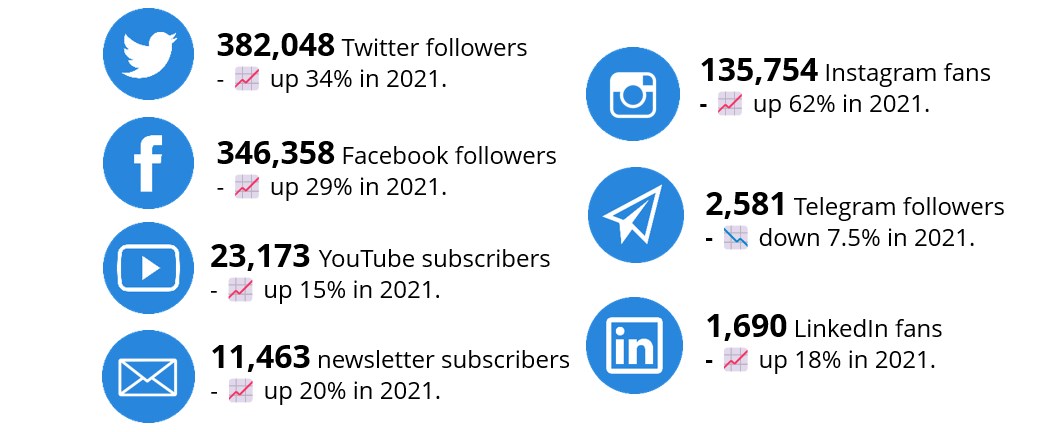
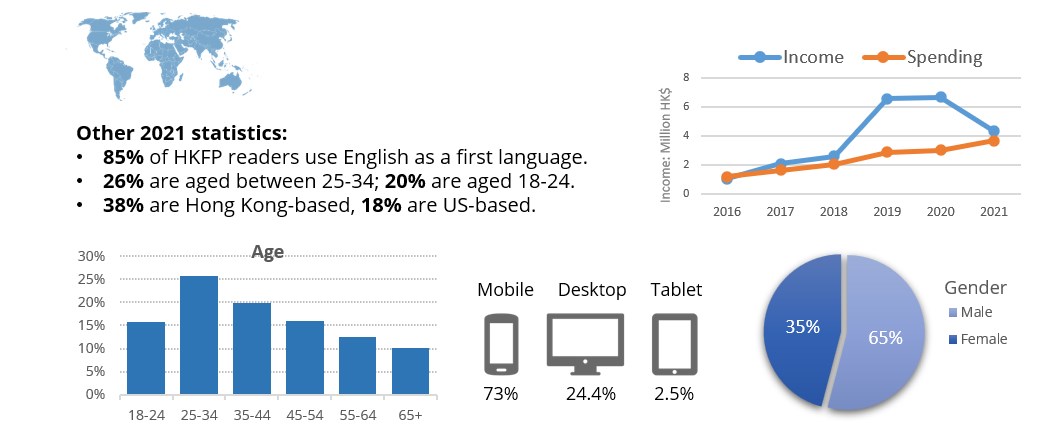

Best of 2021
Original features: Our features in 2021 documented Hong Kong’s transformation under the shadow of the Beijing-enacted security law. We delved into how counsellors and psychologists grappled with the fear of creeping self-censorship in their practice, how booksellers were reported to the national security police during the Hong Kong Book Fair for selling politically sensitive titles, and how one of the city’s last remaining independent bookstores shuttered, citing the political environment.
We also looked at how the city’s filmmakers, publishers and street artists navigated the shifting red lines, and how some Hongkongers are inking messages of resistance onto their own skin.

The city’s media landscape forever changed last year with the closure of pro-democracy newspaper Apple Daily. HKFP was at its newsrooms and printing presses on its last day of operations. We also explored how the city’s Beijing-backed press are gaining more influence.
The year also saw the mass resignations of pro-democracy district councillors after new oath requirements were introduced. We documented the final days of one local councillor in office and explored how the exodus of district representatives also left community newspapers struggling.
As protest-related and national security cases piled up in the city’s courts, we spoke with lawyers compiling a protest case database to preserve the city’s rule of law, the activists writing letters to detained protesters, and the international lawyers who launched an advice website to inform Hongkongers of their legal rights. We also spoke with a refugee from Vietnam who was stuck behind bars for almost three decades after being convicted of murder as a teenager, and eventually decided to abandon his fight against deportation.
Amid the changes of 2021, a wave of Hongkongers left for the UK. HKFP was at the airport when long queues formed as people bid farewell to loved ones. In the UK, we reported on the people helping newly-arrived Hongkongers settle in, as well the pro-China groups pressuring them.

Hong Kong also saw the implementation of a sweeping overhaul of the city’s electoral system. HKFP gave extensive coverage on the day of the city’s first “patriots-only” legislative election – candidates made urgent appeal to voters while Hong Kong saw the lowest turnout rate ever.
Following a 48-hour purge of Tiananmen Massacre monuments from university campuses over Christmas, we also spoke with students, academics, as well as artists behind the statues about what the removals meant for Hong Kong’s efforts to commemorate those who died in the military crackdown of student-led demonstrations over 32 years ago.
Our team visited local businesses at risk of forced closure after government-led redevelopments in Fo Tan and Kwun Tong. Elsewhere, we spoke with the owners of Hong Kong’s remaining iconic Dai Pai Dongs facing eviction from their community, and the elderly villager fighting to save his home from developers in the New Territories. We also reported on the opening of the newly-revamped historic Central Market and the long-awaited M+ museum.

Covid-19 restrictions continued to disrupt Hongkongers’ daily lives last year. We examined government statistics to question whether the city’s severe quarantine measures were really necessary, how even vaccinated people were forced into quarantine centres, how foreign domestic workers faced more challenging working conditions during the pandemic, and the rise in discrimination against South-East Asians. We also delved into the trend of “vaccine selfies,” how pandemic-related pressure on airlines led some pilots to accuse companies of age discrimination, and the plight of those left stranded in the UK during Hong Kong’s months-long flight suspensions.
Our pandemic coverage also tackled how the coronavirus made life even more difficult in the city’s sub-divided flats, the refugees excluded from the city’s vaccination programme, how local mask manufacturers survived in an inundated market, and how local businesses responded to the government-mandated tracing app.
Beyond politics, we delved into the world of polyamory to explore how some Hongkongers navigate romantic ties beyond traditional partnerships, explored the little-known history of siu mai, met the bus fanatics turning Hong Kong bus seats into office chairs, and published a probe into one of the city’s oldest sporting associations. We also looked at how a Muslim headscarf sparked a discrimination row at a school and how volunteers helped to restore Hong Kong’s Hindu cemetery.

2021 was also a big year for Hong Kong sports. We spoke to local athletes during the Tokyo games to learn about daily life at the Olympic village, as well as to the city’s Paralympians about their dreams of sporting glory.
We continued to cover environmental and animal stories last year, including the threat to rare porpoises posed by a development off Lantau, and the task force fighting against dog poisonings.
Last year, we produced 144 fully-fledged features, over 35 interviews, 256 opinion pieces and 276 stories on the ‘patriots only’ elections. We have also published over 1,000 stories on the national security law, and over 1,000 on Covid-19. HKFP Venture also relaunched with over a dozen guides to outdoor adventures.
We expanded our coverage from across the Taiwan Strait, profiling the people fighting for dual citizenship, Hong Kong artists in self-exile, the Hongkongers seeking to contribute to Taiwanese society, the launch of an ambitious new English-language news platform, and the Hongkongers who have joined the local movement to revive the use of Taiwanese in daily life. We also spoke with the Taiwanese maths teacher posting educational videos on Pornhub, cautiously asking: why?

Over the border in mainland China, we reported on a Hongkonger with a history of mental illness who was executed for drug trafficking despite pleas from family and rights groups. And further afield, we reported on the Hongkongers fighting for democracy in Myanmar after the military coup.
Explanatory Reporting: HKFP continued its monthly explainer series on how the city has changed under the Beijing-enacted security law, and we continued our “shifting narratives” series on how the city’s leaders’ attitude towards the Tiananmen Massacre and the traditional mass pro-democracy marches on July 1 evolved over recent years.
We wrote explainers on major political developments, including how Beijing overhauled the city’s electoral system, how authorities moved to erase the memory of Tiananmen, and how the largest teachers’ union was forced to dissolve. We also explained how Hongkongers still found ways to resist despite the national security clampdown.
HKFP also examined trends in leader Carrie Lam’s past policy addresses after she delivered the last one of her current term, analysing what it all meant for the city’s future.
We broke down how Beijing’s overhaul of the city’s electoral process ensured that almost every candidate for the new Election Committee was guaranteed a seat. We looked at where Beijing’s national security crackdown has left the city’s pro-democracy camp, and who the approved candidates were in the city’s first legislative poll following the sweeping overhaul.
Our team also wrote practical guides informing our readers how to sign up for the government’s electronic stimulus vouchers, how to enter lucky draws for the fully vaccinated, how to get vaccinated against Covid-19, and how to write letters to prisoners.
Interviews: Last year, we touched in again with Chinese dissident artist Ai Weiwei about what he saw as the future of art in the city. We also spoke with Democratic Party leader Lo Kin-hei about the party’s future in the shifting political climate, and political scientist Ma Ngok on what Beijing’s electoral overhaul means for democracy in Hong Kong.

At the other end of the political spectrum, we spoke to the founder of the new pro-Beijing Bauhinia Party Charles Wong, and pro-establishment lawmaker Michael Tien on the future of Hong Kong politics. We also sat down with pro-Beijing figure Adrian Ho about running one of the city’s largest pro-establishment online communities.
We spoke with a number of activists before they were put behind bars, including democrat and labour activist Raphael Wong ahead of his sentencing for an unauthorised assembly, and student activist Wong Yat-chin before he was arrested and denied bail under the security law.
We also spoke to other dissidents, including former student leader Owen Au about what he saw as the future of protest in the city and investigative journalist Bao Choy after her conviction over accessing public records for a documentary on alleged police collusion with triads.

We interviewed dissidents elsewhere in the region, including Singaporean activist Jolovan Wham about his arrest after a one-man protest. And during the Tokyo Olympics, we were the first newspaper to catch up with Hong Kong’s only gold medal winner, fencer Edgar Cheung, about how he kept calm under pressure.
Arts: We also sat down with the city’s creatives, including the director of the protest documentary “Revolution of our Times” Kiwi Chow about why he is staying put in the city, musician Cehryl on the impact of Covid on live music, artist Sampson Wong on finding beauty in Hong Kong, and Yim Chiu-tong, the Plumber King, whose advertisements became part of a street art exhibition.
In Taiwan, our reporter interviewed the island’s only weed lawyer, a politician defending democracy on Matsu island 17 km from mainland China, and dissident Wu’er Kaixi ahead of the 32nd anniversary of the Tiananmen Massacre. And we also spoke with Taipei-based singer Kimberley Chen about shrugging off China’s censors.
Authors: We spoke with journalist and author Joanna Chiu about her new book detailing China’s web of influence abroad and Western complicity in China’s rise, and veteran journalist Stephen Vines about his last book on Hong Kong before he fled back to the UK.

‘Patriots poll: Ahead of the city’s first “patriots-only” legislative race, we spoke to three candidates from across the political spectrum including self-proclaimed non-pro-establishment Adrian Lau, Vincent Diu, an electrician who declared as independent, and Nixie Lam, who was seen by her pro-establishment supporters as their international spokesperson. After the race, we also sat down with Tik Chi-yuen, the only lawmaker-elect who claimed to be non-pro-establishment.
Scoops: We broke the story of how mainland Chinese and Hong Kong Wikipedia users were fighting over the narrative of the Hong Kong protests on the site, and the ensuing safety concerns for Hong Kong users. As a result of our report on the Wikipedia wars, the site banned seven mainland Chinese users for “infiltration and exploitation.”
We found Hong Kong public libraries had removed almost a fifth of titles relating to the 1989 Tiananmen Massacre from their shelves since 2009, and that the Bar Association had launched probes into legal icons Martin Lee and Margaret Ng after their convictions for unauthorised assembly.
We also broke the story of how city authorities spent millions of taxpayer dollars to lobby Washington against the passing of the Hong Kong Human Rights and Democracy Act.

2020 Achievements
NewsStream project complete: In 2019, HKFP won a US$78,400 (HK$615,440) Google News Initiative grant to create an open-source funding platform for small newsrooms focussed on nurturing reader membership. The funds went to third-party developers to help create NewsStream – a fundraising micro-site to reduce barriers and costs for independent news start-ups. Our new support.hongkongfp.com site finally launched in 2021, allowing readers to begin, pause and cancel memberships.

Redesign & promotion: The launch also included a design refresh across social media and new HKFP Patron promotions by szs.io.
2021 Funding Drive: With an accompanying video, HKFP beat its target of 1,000 monthly Patrons during our #PressingOn Funding Drive.
TapNGo: As part of our drive to make it as easy as possible to contribute, we brought TapNGo online, as a new payment method.
2021 expansion: HKFP hired three new staff at the end of 2021 and moved to a larger, private office at The Hive K-Town.

Prizes: HKFP won an honourable mention in the 2021 prestigious SOPA awards for Excellence in Opinion Writing: “Hong Kong’s protest movement in perspective” by Steve Vines bagged the prize. Meanwhile, our newsroom was nominated for a Nobel Peace Prize.

Fundraising: We raised over HK$100,000 selling books by columnist Steve Vines and ethical, organic #PressFreedom t-shirts.

Placement & Impact
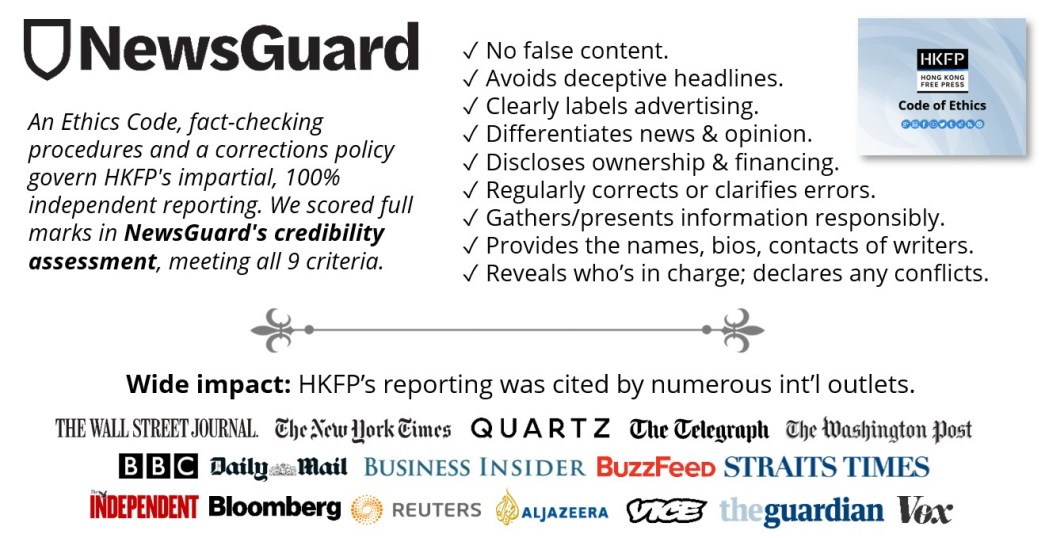
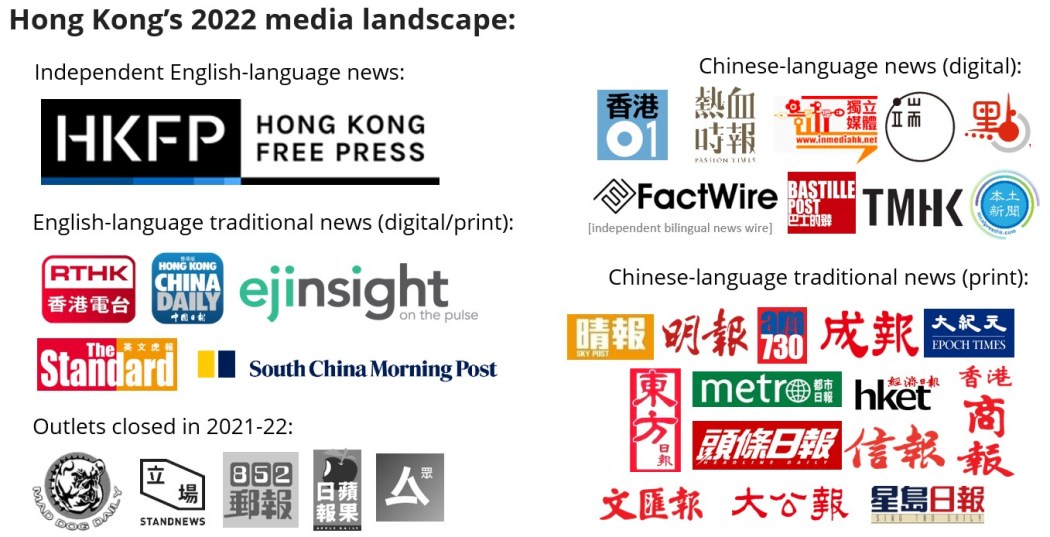

Distribution Channels


HKFP 2022 Team
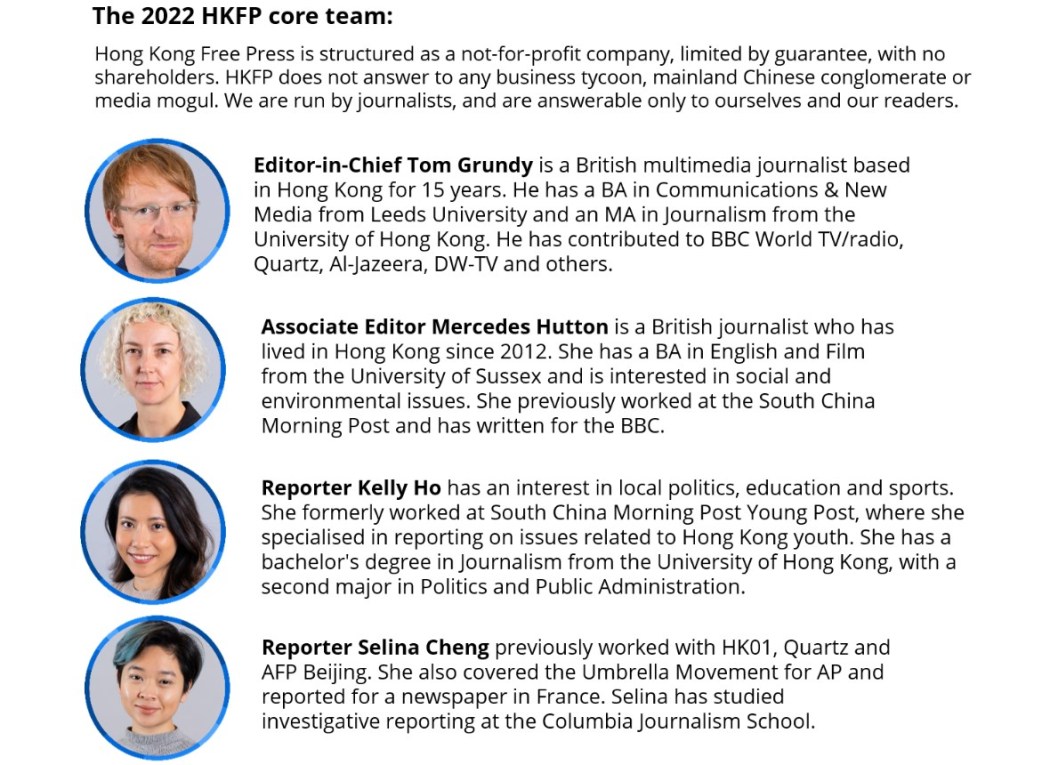
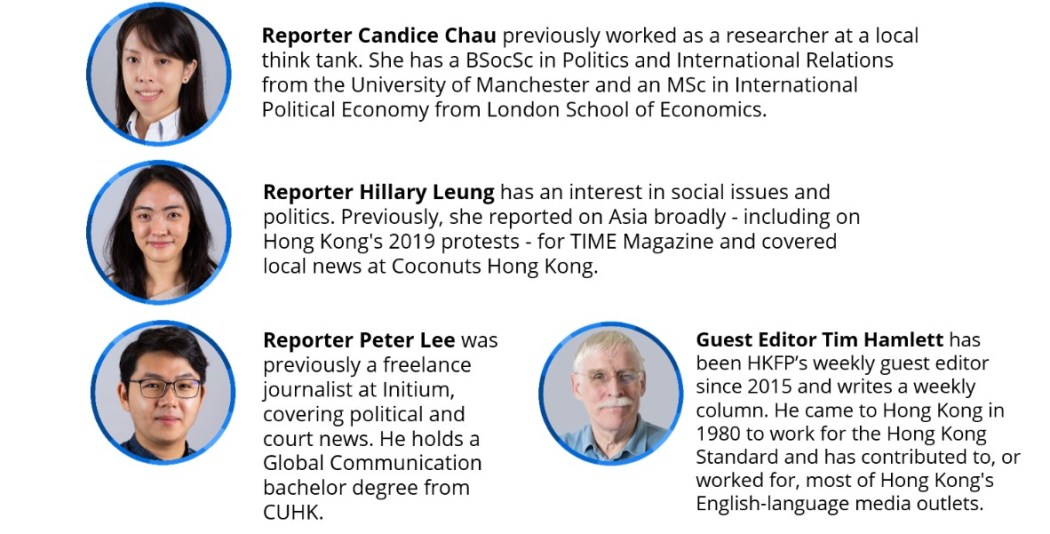

Transparency Report
Income:
As Hong Kong’s most transparent news outlet, and as a non-profit company, HKFP is externally audited annually. Our finalised, audited income during 2020, and our predicted income for 2021:
| Income | 2021* | 2020 | 2019 | 2018 | 2017 | 2016 |
|---|---|---|---|---|---|---|
| Reader contributors | HK$4,164,565 | HK$6,357,972** | HK$6,056,859** | HK$2,463,408 | HK$1,769,760 | HK$1,063,125 |
| Ads & content sales | HK$198,983 | HK$110,247 | HK$271,066 | HK$136,084 | HK$328,759 | HK$92,276 |
| Events | HK$0 | HK$0 | HK$263,361 | HK$24,390 | HK$0 | HK$8,352 |
| Bank interest | HK$25 | HK$10 | HK$226 | HK$21 | HK$1 | HK$12 |
| Gov’t Covid subsidy | HK$0 | HK$216,000 | HK$0 | HK$0 | HK$0 | HK$0 |
| Total: | HK$4,340,489† | HK$6,697,010 | HK$6,591,512 | HK$2,623,903 | HK$2,098,520 | HK$1,163,765 |
Income: HKFP is predicted to make a monthly loss of up to HK$100K in 2022, but is able to reinvest its previous surplus.
Our current revenue streams:
- Reader contributions: includes one-off & monthly Patron contributions by cheque/transfer, cash, PayPal & card, as well as merch sales profit & shopping referral links.
- Ads & content sales: includes ad income from display ads; Apple News & Facebook ads, Google/YouTube ads, directly purchased rate card ads & content sales [from media outlets, institutions and syndication partners LexisNexis, Dow Jones Factiva & Nordot.]
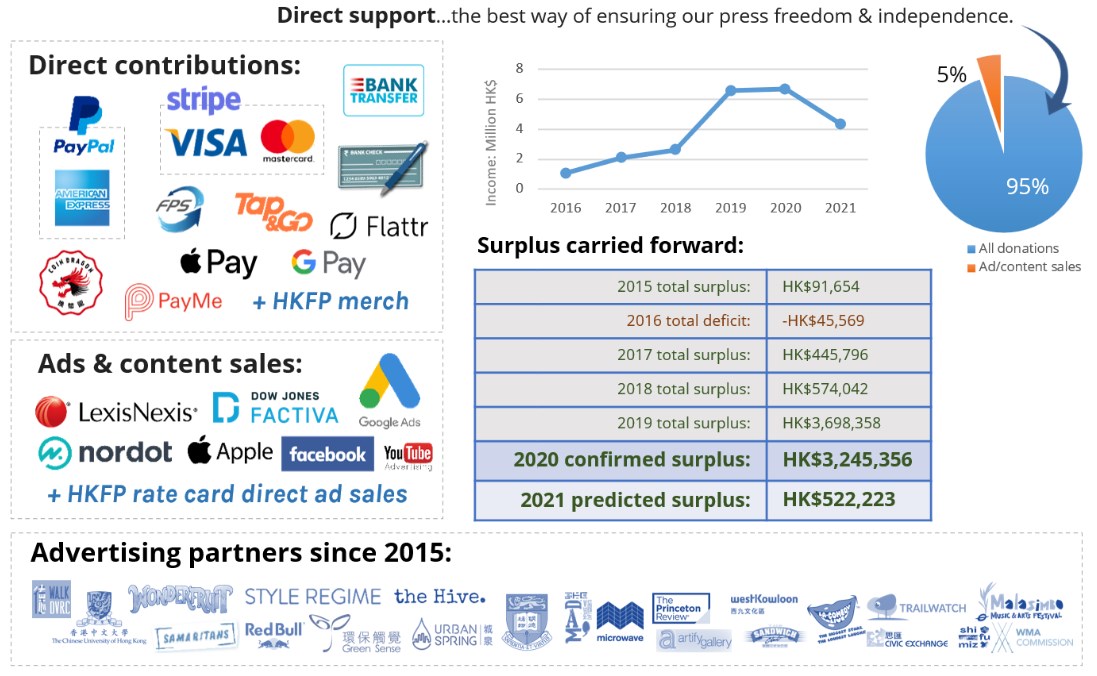
Surplus recycled: As a non-profit, with no shareholders or investors, HKFP’s surplus was recycled back into the company for use in 2021. As of 2021, HKFP is retaining a HK$1.5m legal defence fund in light of new threats to press freedom.
Efficiency: HKFP is run as efficiently and prudently as possible, in order to maximise the impact of our donors’ generosity. We make savings by partnering with other media outlets, using free software and making full use of teamwork and automation to save on costs.
Staffing: During 2020, we employed 5-6 full-time staff members and expanded our pool of freelancers. We spent 72% of our income on paying our hard-working staff and freelancers.
Spending:
HKFP Patrons in 2021: HKFP relies on a membership model. Small amounts of income from a large pool of Patrons helps support our team, sustain our operations with more security, and guarantee our independence. Our monthly income as of January 2022:
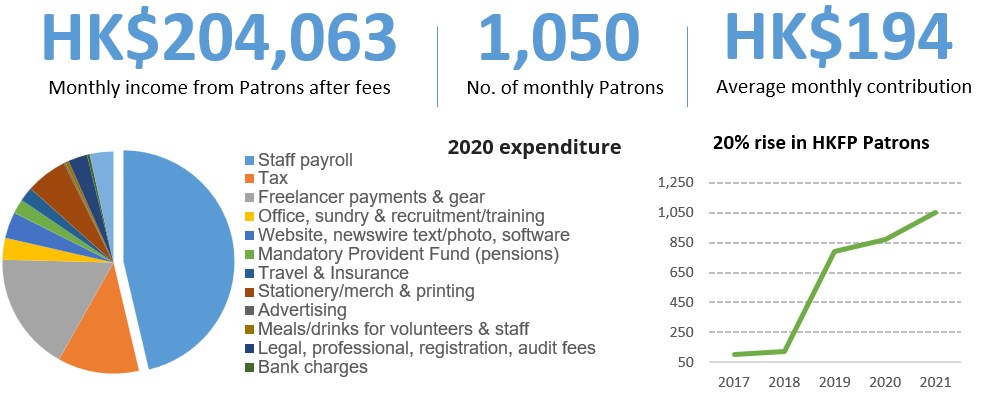
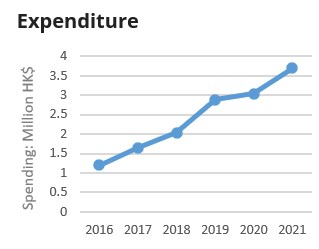
- The number of HKFP Patrons rose by 20.4% in 2021, whilst income from Patrons rose almost 16% to HK$204,063. Most Patrons are from Hong Kong, though we also have backers in the US, UK, Australia and China.
- In addition to the above, we receive at least HK$10,000 per month from offline donors who contribute via cheque, transfer/FPS or by coin donation via CoinDragon.
- Patrons are given priority and/or free entry to HKFP events, merch and our Annual Report.
Finalised expenditure for our latest audited year, 2020, & our predicted 2021 spending:
| Expenditure | 2021* | 2020 | 2019 | 2018 | 2017 | 2016 |
|---|---|---|---|---|---|---|
| Full-time staff payroll | HK$1,952,852 | HK$1.599m | HK$1.606m | HK$1.499m | HK$1.340m | HK$1.035m |
| Mandatory Provident Fund (pensions) | HK$76,442 | HK$72,221 | HK$68,123 | HK$69,234 | HK$66,180 | HK$50,942 |
| Web & software, newswire, commission | HK$140,992 | HK$132,269 | HK$80,038 | HK$129,543 | HK$58,693 | HK$33,083 |
| Office, sundry, recruitment/training, telecom | HK$198,116 | HK$109,289 | HK$164,256 | HK$110,414 | HK$57,565 | HK$25,801 |
| Meals/drinks for volunteers/staff/sources | HK$18,554 | HK$18,324 | HK$29,686 | HK$14,028 | HK$17,106 | HK$25,531 |
| Legal, professional, registration, audit | HK$35,422 | HK$96,505 | HK$12,340 | HK$7,385 | HK$45,231 | HK$10,845 |
| Travel & insurance | HK$4,069 | HK$72,391 | HK$50,615 | HK$78,067 | HK$8,169 | HK$8,267 |
| Stationery, merch, postage, printing | HK$201,534 | HK$208,544 | HK$42,311 | HK$11,827 | HK$686 | HK$17,124 |
| Bank charges, penalties & exchange losses | HK$3,335 | HK$13,752 | HK$4,240 | HK$1,705 | HK$1,170 | HK$2,218 |
| Freelancer payments & gear | HK$934,621 | HK$595,693 | HK$289,387 | HK$64,400 | HK$34,090 | HK$0 |
| Tax | HK$52,304 | HK$408,496 | HK$509,211 | HK$29,816 | HK$13,343 | HK$0 |
| Advertising | HK$78,745 | HK$6,914 | HK$36,597 | HK$34,371 | HK$10,261 | HK$0 |
| Membership, research/polls, repairs & other | HK$25,070 | HK$118,800 | – | – | – | – |
| Total: | HK$3.79m† | HK$3.04m* | HK$2.89m* | HK$2.04m | HK$1.65m | HK$1.20m |

HKFP Press Freedom Update
January 2021
- The Hong Kong government announced a decision to move Covid-19 press briefings online. It backtracked following criticism from a Hong Kong journalism watchdog.
- Police demanded Apple Daily hand over the information on journalists who searched for public vehicle licence plate records.
- Police visited the newsrooms of Apple Daily, InMedia and StandNews with search warrants demanding documents relating to the primary election for LegCo in July 2020.
- The head of RTHK, Leung Ka-wing, advised staff not to interview the 55 democrats arrested under the national security law over their alleged involvement in the primary.
- Three people convicted of rioting and assaulting a mainland journalist at the airport during anti-government protests in 2019 were jailed for up to 5 1/2 years.
- Bao Choy pleaded not guilty to making false statements after she obtained vehicle registration information for a film about the 2019 Yuen Long mob attacks.
- The head of Hong Kong’s largest police union slammed public broadcaster RTHK for allegedly biased reporting of a weekend lockdown to combat Covid-19.
- The staff union at RTHK staged a silent protest to support fellow journalist Nabela Qoser, after she was told to accept a new short-term contract or face dismissal.
- The Communications Authority ruled that three episodes of RTHK’s satirical programme Headliner insulted and denigrated the police force, and “strongly advised” the station to follow broadcasting regulations more closely.
- Three parliamentarians from the Norwegian Liberal Party nominated Hong Kong Free Press for a Nobel Peace Prize.
February 2021
- RTHK suspended BBC World News after a ban in China over its Xinjiang reporting.
- Security officers at the West Kowloon Magistrates’ Courts barred at least two reporters from attending a trial hearing, to protect the identity of a police officer who had provided a witness statement anonymously.
- Hong Kong’s High Court refused to grant bail to media mogul Jimmy Lai again over national security law charges.
- Director of Broadcasting Leung Ka-wing resigned from his post at RTHK six months before the end of his term.
- A Hong Kong government report found “deficiencies” in the editorial management of RTHK.
- Funding for RTHK was cut by 4.6 per cent in the 2021-22 budget.
- Baptist University cancelled the World Press Photo exhibition, which included images of the Hong Kong protests, two days before its expected launch.
March 2021
- A top Beijing official said the principle of “patriots governing Hong Kong” extends to the judiciary, the education sector and the media, in addition to public officials.
- A leading civil servant with no broadcasting experience took over as head of RTHK, where three senior employees quit in the space of two weeks.
- Hong Kong’s national security police arrested a former top executive of Next Digital, the publisher of Apple Daily, over alleged fraud.
- RTHK made a last-minute decision to cancel a programme featuring a panel discussion of Beijing’s plans for a drastic election overhaul.
- The cinema screening of a documentary about a violent campus clash between student protesters and police in 2019 was cancelled at short notice after a pro-Beijing newspaper claimed the film may violate the national security law.
- Hong Kong’s Ombudsman said that it would investigate the Immigration Department for refusing a work visa to Hong Kong Free Press for its incoming editor in 2020.
- Bao Choy went on trial for allegedly violating the Road Traffic Ordinance in seeking to obtain vehicle licence plate information for a documentary.
- RTHK axed another episode of a current affairs programme at short notice, the ninth such cancellation since the new Director of Broadcasting Patrick Li took office.
- The Hong Kong government announced plans to restrict public and media access to currently available information on company directors listed in the Companies’ Registry.
- RTHK sought to withdraw its entries from journalism awards.
April 2021
- RTHK said that the Hong Kong government has the power to surcharge its employees for the cost of axed programmes.
- Amnesty International Hong Kong said the state of human rights and freedoms in Hong Kong had deteriorated under the national security law in 2020.
- The public perception of the independence and credibility of Hong Kong’s news media dropped to a record low, according to an opinion poll.
- Chief Executive Carrie Lam said the Hong Kong government is the “biggest victim of fake news,” after pledging to submit a bill to tackle “doxxing” within the current legislative term.
- RTHK dropped veteran journalist Steve Vines as a regular current affairs commentator on its Morning Brew programme after more than ten years.
- The Epoch Times’s printing presses were ransacked by a gang of men wielding sledgehammers.
- Hong Kong journalist Yvonne Tong, who famously challenged a WHO official, resigned from RTHK.
- Reporters Without Borders East Asia warned that silence from the Hong Kong authorities over an attack on the Epoch Times is fostering a “climate of suspicion” against journalists and “encouraging” violent attacks on the media.
- Police chief Chris Tang said media outlets that endanger the security of Hong Kong by publishing “fake news” will be investigated.
- State-owned newspaper Ta Kung Pao in a full-page cover story accused Apple Daily and other pro-democracy “yellow media” of “constantly creating fake news.”
- Reporters without Borders warned that the national security law posed a “grave threat” to the city’s journalists as Hong Kong remained 80th out of 180 regions in the 2021 world press freedom index.
- RTHK rejected a media award for a TV documentary about the police handling of the Yuen Long mob attack in 2019.
- The Hong Kong government criticised a Reporters Without Borders report which warned that the national security law poses a “grave threat” to journalists in the city.
- Hong Kong documentary producer Bao Choy was found guilty and fined HK$6,000 for knowingly making false statements to obtain vehicle ownership records for the RTHK programme on the Yuen Long mob attacks of 2019.
- Police confirmed that a journalist from Ta Kung Pao was arrested in February for making false statements to obtain public vehicle records.
- The Foreign Correspondents’ Club urged Hong Kong’s police chief to clarify his recent comments about “foreign forces” attempting to stir hatred and conflict in the city using disinformation.
- Beijing accused the FCC of being an external force interfering with China’s internal affairs and undermining the city’s rule of law.
- A fifth senior staffer resigned from RTHK.
- RTHK signed up Chief Executive Carrie Lam to host her own daily show on Beijing’s electoral overhaul for the city.
- RTHK axed another episode of a TV documentary series about online media financed by public donations after a month-long vetting.
May 2021
- RTHK began removing shows from its YouTube channel and Facebook page a year after they air. It deleted its archive of content over a year old.
- The Hong Kong Press Freedom Index hit a record low where close to 99 per cent of respondents said the Beijing-enacted national security law harmed the city’s free press.
- RTHK refused to extend an employment contract for journalist Nabela Qoser following an extended probation period. Qoser was known for her vigorous questioning of officials.
- Hong Kong journalist Bao Choy filed an appeal against a magistrate’s decision to convict her after she accessed public records to investigate police behaviour during the “7.21” mob attack at Yuen Long MTR station in 2019.
- An executive producer who led Hong Kong’s longest running TV documentary programme Hong Kong Connection resigned from RTHK.
- Epoch Times reporter Leung Zhen was attacked by a man wielding a baseball bat from a passing vehicle.
- Assets belonging to pro-democracy media tycoon Jimmy Lai were frozen by the Hong Kong authorities.
- Trading in shares of Next Digital, the parent company of Hong Kong’s largest pro-democracy newspaper Apple Daily, were suspended at the company’s request.
- Hong Kong’s Security Secretary John Lee denied that the freezing of the assets of pro-democracy media tycoon Jimmy Lai represented a crackdown on press freedom.
- RTHK denied replacing an episode of Hong Kong Connection about the proposed shake-up of the city’s electoral system following local media reports that it had been axed.
- RTHK axed a story about the annual Tiananmen Massacre anniversary long-distance run from its news show “LegCo review”.
- WhatsApp chats which democrat Claudia Mo had sent to media organisations like the BBC and the New York Times outlining her fears for freedom of speech in the city were deemed by a High Court judge to be sufficient grounds to deny her bail.
June 2021
- RTHK axed another current affairs programme, “Letter to Hong Kong”.
- It is announced that pro-democracy media tycoon Jimmy Lai is to stand trial on national security charges in Hong Kong’s High Court, where the maximum penalty is life imprisonment.
- A Hong Kong court ruled that a local female reporter was guilty of resisting a police officer in the execution of their duties while covering a protest in Mong Kok in May 2020.
- Hong Kong’s Department of Justice dropped a charge of improperly accessing public records against a reporter for Beijing-owned newspaper Ta Kung Pao.
- Hundreds of Hong Kong police officers raided the pro-democracy newspaper Apple Daily and arrested five senior executives on suspicion of violating the national security law.
- Hong Kong’s security chief John Lee accused pro-democracy tabloid Apple Daily of using journalism as a tool to endanger national security.
- Two senior executives from the pro-democracy newspaper Apple Daily were charged under the national security law for allegedly conspiring to collude with foreign powers.
- Hong Kong public broadcaster RTHK fired outspoken pro-democracy radio host Tsang Chi-ho.
- Next Digital CEO Cheung Kim-hung and Apple Daily Editor-in-Chief Ryan Law facing national security charges were denied bail at the West Kowloon Magistrates’ Courts.
- Pro-democracy Apple Daily newspaper warned it was unable to pay staff and was at imminent risk of closure after the government froze company assets citing the national security law.
- Apple Daily’s finance section, its English edition, Twitter account and video department ceased operations following an exodus of staff.
- Police arrested an Apple Daily editorial writer under the national security law for allegedly conspiring to collude with foreign forces.
- Hong Kong pro-democracy tabloid Apple Daily decided to halt all operations in the city and published its last edition of the newspaper on June 24.
- Two Apple Daily executives arrested on suspicion of endangering national security sought a court order for Hong Kong police to return journalistic and privileged legal material seized during their arrest and in a raid on the newspaper.
- Hong Kong national security police arrested a former editorial writer for Apple Daily at the airport as he was about to fly to Britain.
- Independent digital outlet Stand News announced it will remove opinion articles and columns it published before May and stop accepting donations in order to reduce risks under the national security law.
- Human Rights Watch released a report saying that basic rights and freedoms in Hong Kong were being “erased” under the security law.
- Hong Kong public broadcaster RTHK sacked veteran journalist Allan Au from hosting a phone-in radio programme.
- Veteran Hong Kong journalist and commentator Steve Vines announced his departure from public broadcaster RTHK.
July 2021
- Hong Kong public broadcaster RTHK axed the current affairs programme The Pulse, hosted by veteran journalist Steve Vines.
- NGO Reporters Without Borders released a report accusing Chief Executive Carrie Lam of trampling on the city’s press freedom, and listed her as a “predator.”
- Hong Kong Journalists Association published its annual report saying that the city’s press freedom was “in tatters.”
- Local media reported that a senior executive at Now News resigned citing “turbulent times” for Hong Kong’s media.
- Staff at public broadcaster RTHK were ordered to refer to Taiwan as part of China.
- A sexual assault complaint against a Hong Kong police officer who allegedly touched the breast of a female journalist was dropped after the force failed to identify the officer.
- Three former Apple Daily journalists had their bail revoked by national security police.
- Hong Kong Secretary for Home Affairs Caspar Tsui told lawmakers that the government was mulling plans to implement a “fake news” law.
- Four former Apple Daily journalists charged under the national security law were denied bail in court.
- Hong Kong national security police confiscated the travel documents of a reporter who filmed a knife attack against an officer.
- Two former editors of pro-democracy tabloid Apple Daily charged under the national security law withdrew their bail review applications.
- The Hong Kong government appointed a special fraud investigator to scrutinise pro-democracy newspaper Apple Daily’s parent company Next Digital.
August 2021
- Digital Hong Kong news outlet Initium became the first media organisation to quit the city following the implementation of the national security law, as the outlet moved to Singapore.
- HKFP columnist and ex-RTHK broadcaster Steve Vines left Hong Kong for the UK citing the security law crackdown.
- Hong Kong public broadcaster RTHK deleted all of its English-language Twitter archive and prevented readers from “replying” to its tweets citing resource constraints.
- Chief Executive Carrie Lam announced that public broadcaster RTHK will partner with China Media Group – the holding group for CCTV and China National Radio – to air more programmes.
- Beijing-controlled Wen Wei Po called for the Hong Kong Journalists Association (HKJA) to be regulated.
September 2021
- All remaining directors of Next Digital, parent company of Apple Daily, resigned and called for the company’s liquidation, citing a “climate of fear” created by the national security law.
- Hong Kong public broadcaster RTHK said it is committed to promoting public debate following reports that it axed another current affairs programme, the 41-year-old City Forum.
- The Hong Kong Journalists Association hit back at criticism from the Secretary for Security, who accused it of infiltrating campuses to “rope in” student journalists as members.
- The head of the Hong Kong Journalists Association said that the security chief’s suggestion that the group could make public its members’ information may be in violation of the Privacy Ordinance.
- A Hong Kong cartoonist apologised to police for a satirical comic strip which linked the Junior Police Call organisation to a controversy over the Hong Kong Journalists Association.
- Hong Kong public broadcaster RTHK refused to comment on the whereabouts of its English-language radio presenter Hugh Chiverton after he disappeared from the airwaves without explanation.
- Hong Kong’s Financial Secretary asked a court to wind up Next Digital Limited, the parent company of Apple Daily, in the “public interest.”
- Public broadcaster RTHK told its staff to avoid contact with foreign governments or political organisations under new editorial guidelines, as it vowed to prevent acts that endanger national security.
October 2021
- Two Hong Kong news organisations were barred from attending a reception organised by the local media sector in celebration of the upcoming Chinese National Day.
- Hong Kong public broadcaster RTHK refused to say why it deleted a story from its website about proposals for a new law criminalising insults against public officers.
- The Hong Kong Journalists Association apologised for the alleged theft of its members’ personal information, after a Beijing-backed newspaper published shredded documents taken from the office trash.
- Police rejected 26 out of 27 complaints submitted by the Hong Kong Journalists Association as “not pursuable.”
- The Independent Police Complaints Council accused the Hong Kong Journalists Association of airing misinformation over misconduct investigations.
- Two registries announced new rules tightening public access to government records to step up the protection of personal data privacy.
- Hong Kong democrat Alan Leong was dropped by Ming Pao as a writer for the newspaper’s legal column, ending an 18-year term.
November 2021
- The Consumer Council cancelled an annual consumer reporting awards contest co-organised with the Hong Kong Journalists Association.
- An anonymous survey conducted by the Hong Kong Foreign Correspondents’ Club found that close to half of the respondents considered leaving Hong Kong.
- The Chinese Foreign Ministry expressed “strong disapproval” of the member survey conducted by the Hong Kong Foreign Correspondents’ Club.
- Digital media outlet DB Channel announced plans to shut down operations in Hong Kong after the channel’s co-founder Frankie Fung was denied bail pending trial under the national security law.
- Hong Kong police closed an investigation into a baseball bat attack on an Epoch Times reporter, with no one facing charges.
- Hong Kong digital news outlet Stand News was nominated for the Reporters Without Borders 2021 Press Freedom Prize for Independence.
- The Economist said that the Hong Kong authorities refused to renew a work visa for their correspondent Sue-Lin Wong, without providing an explanation.
- Chief Executive Carrie Lam refused to explain why a journalist from the Economist was denied a work visa renewal, saying any government has discretion on the issuing of visas.
- The Hong Kong government is conducting a legal study on the problem of “fake news,” Chief Secretary John Lee said.
- Hong Kong public broadcaster RTHK removed from its website a news report about Chinese tennis star Peng Shuai, who accused a former top Chinese official of sexual assault.
- Chief Executive Carrie Lam vowed to “proactively plug loopholes” in the city’s internet regulation to ensure “fake news” circulating online does not “harm society.”
- Hong Kong’s High Court partially upheld a decision made by the Communication Authority against public broadcaster RTHK, which stated that it presented factual inaccuracies and denigrated the police force in a now-axed satirical show.
December 2021
- Hong Kong public broadcaster RTHK “paused” the social media pages of a dozen programmes, including the axed political satire show Headliner and the popular Hong Kong Connection which was still in production.
- Hong Kong pro-democracy media tycoon Jimmy Lai and the staff of Apple Daily won the Golden Pen of Freedom award.
- The Secretary for Constitutional and Mainland Affairs Erick Tsang threatened the Wall Street Journal over an editorial it published about the city’s first “patriots-only” legislative race.
- Reporters Without Borders said press freedom in Hong Kong was in “free fall” in its latest report on China.
- Hong Kong’s High Court ordered that Next Digital Limited – the parent company of the now-defunct Apple Daily – must be wound up.
- RTHK broadcasters outside of the news department were ordered not to discuss the University of Hong Kong’s removal of a Tiananmen Massacre statue.
- Over 200 national security police officers were deployed to raid the offices of non-profit online news outlet Stand News, seven people linked to the outlet were arrested.
- Hong Kong independent media outlet Stand News announced its decision to shut following a newsroom raid and seven arrests. Its website and social media pages were deleted.
- Two former chief editors of digital media outlet Stand News were denied bail by a court after they were accused of publishing seditious materials.
- Justice Secretary Teresa Cheng said that criticism from foreign politicians and organisations over the arrest of figures connected to Stand News were “baseless” and “in blatant violation of international law.”
January 2022
- Independent Hong Kong media outlet Citizen News announced that they decided to halt operations. They said the decision was to ensure staff safety and was prompted by the authorities’ crackdown on fellow independent newsroom Stand News.
- Chief Executive Carrie Lam said the closure of Stand News and Citizen News in under a week were unrelated to the national security law and press freedom.

Support HKFP into 2022
Not-for-profit, run by journalists and completely independent, the HKFP team relies on readers to keep us going and to help safeguard press freedom.
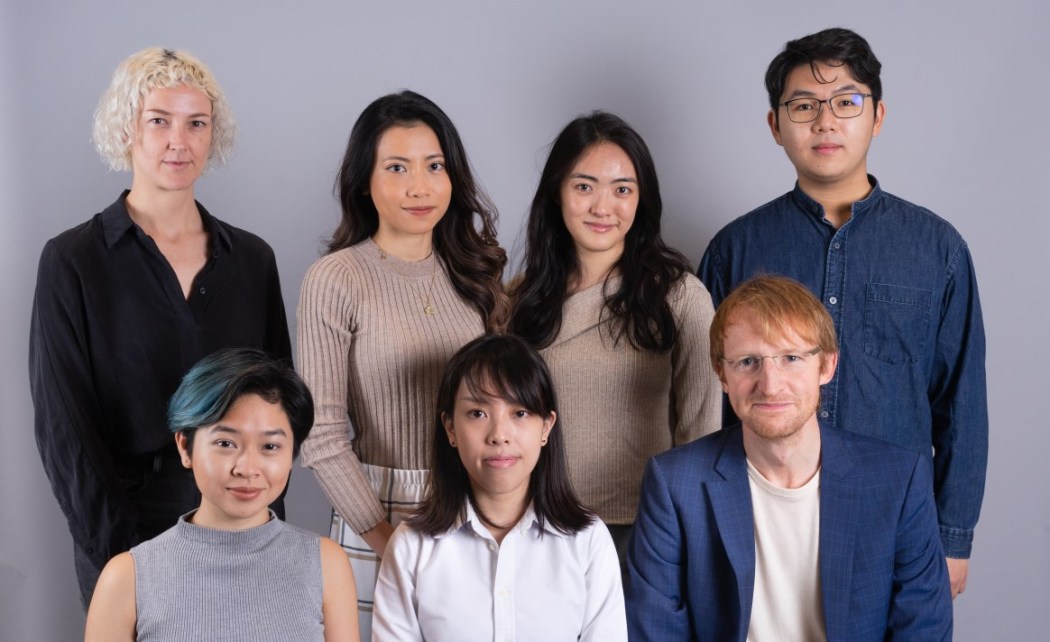
Donate by cheque
Cheques of amounts up to HK$50,000 may be made payable to Hong Kong Free Press Limited and posted – along with your full name and address to: HKFP, The Hive Kennedy Town, 6/F, Cheung Hing Industrial Building, 12P Smithfield Road, Kennedy Town, Hong Kong. [Contributions are confidential – a paper-trail is required for our internal accountancy records.]
Donate online via card, PayPal, direct transfer to our HSBC account or via FPS:
One-off or monthly contributions can be made with your Visa, Mastercard, or Apple Pay/Google Pay via Stripe on our website: support.hongkongfp.com.
Donate via HSBC PayMe
Scan our QR code to make an HSBC PayMe digital payment. Please include your full name and email address so we may accept your contribution.
Donate spare coins
Hoarding a jar of coins? Donate spare change at Coin Dragon machines around the city.
Buy HKFP merchandise
Show your support for press freedom with our range of HKFP merchandise. Made in Hong Kong, designed by artist Badiucao.
Donate gear or sponsor our operations
We welcome contributions of new computer or audio-visual equipment. We also welcome sponsorship of our ongoing operational costs – please get in touch if you can support us.
Buy HKFP merchandise
Show your support for press freedom with our range of HKFP merchandise. Made in Hong Kong, designed by artist Badiucao.
‘Tip’ us with a micro-donation
‘Tip’ HKFP with a micro-donation via Flattr.
Advertise with us
Support us and promote your business or cause at the same time. Request our rate card and consider our affordable range of digital marketing solutions.
Shop at Book Depository
HKFP receives a 5% commission if you shop at the Book Depository via bit.ly/hkfpbooks.


